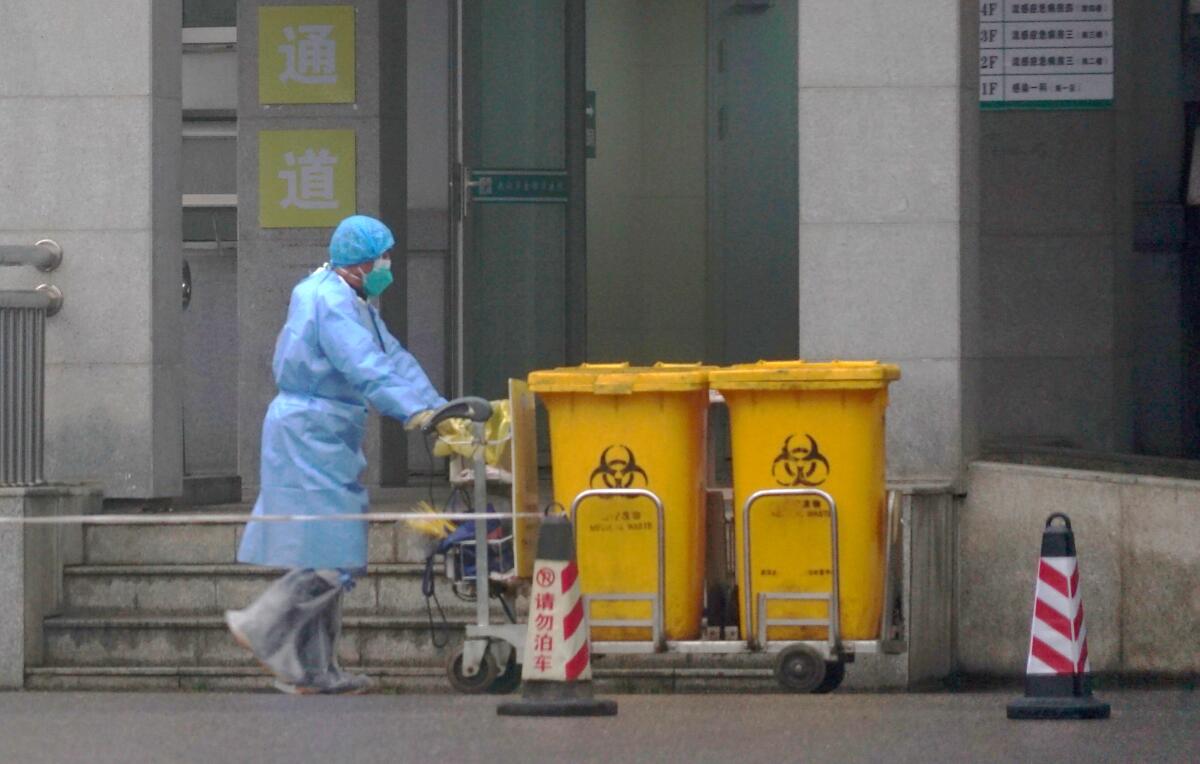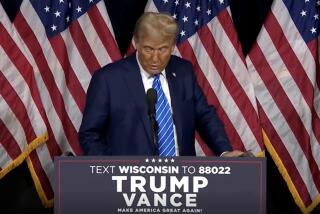Op-Ed: Trump’s war on Voice of America is all about him — as usual

- Share via
Throughout its history, Voice of America has sometimes run afoul of American politicians.
The criticism, which comes with the territory, is generally based on a basic misunderstanding of VOA’s role. The service, which produces radio, television and text journalism in 47 languages for dissemination around the world, was never intended to be a peddler of propaganda. Rather, it is required by its charter to present news that is “accurate, objective, and comprehensive.” It must be both believable and an expression of American values, providing a credible source of news to parts of the world where accurate reporting is in short supply.
President Trump came late to this game. Two years after his election, he didn’t appear to know that VOA and the other broadcasters comprising the U.S. Agency for Global Media even existed. In November 2018, he suggested that the U.S. government create its own “Worldwide Network to show the World the way we really are, GREAT!”
In fact, we’ve had such a network since 1942.
VOA today broadcasts to a weekly measured audience of 280 million people. Secretary of State Mike Pompeo and Israeli Prime Minister Benjamin Netanyahu are among those who have been interviewed recently on VOA’s Persian service, which can now be heard and seen 24 hours a day with a robust audience in Iran. The Agency for Global Media’s Arabic service, now in its 16th year, tells America’s story on TV and radio in 22 Middle Eastern countries, 21 of which are rated “not free” or “partly free” by the nonprofit democracy-promotion group Freedom House.
Recently, VOA drew the president’s ire. He attacked the news service, saying it had “amplified Beijing’s propaganda” in its coverage of the lifting of the lockdown in the Chinese city of Wuhan. The truth is that Chinese officials are no fans of VOA. They have spent billions of dollars trying to block it from reaching their citizens but with limited success.
The White House complained that VOA accepted China’s coronavirus statistics in reporting that the U.S. had surpassed China in reported cases of COVID-19. In fact, like the many other media outlets that featured the story, including the Wall Street Journal and the Los Angeles Times, VOA relied on a tally by Johns Hopkins researchers for its conclusions.
The White House also claimed “VOA called China’s Wuhan lockdown a successful ‘model’ copied by much of the world.” But the story in question, an Associated Press article picked up by VOA, was actually quite nuanced. “While there are questions about the veracity of China’s count,” it said, “the unprecedented lockdown of Wuhan and its surrounding province of Hubei have been successful enough that countries around the world adopted similar measures.” That’s undeniably true.
By no stretch of the imagination is VOA pro-Chinese or anti-American. VOA’s reporters try, very simply, to get the story right.
When mass protests erupted in Hong Kong last June, VOA sent seven journalists to cover the story of resistance to the Beijing regime. They risked their lives to produce deeply reported stories in multiple languages, including Mandarin, Cantonese and English, bringing life to an explosive moment in the history of the region.
VOA’s broadcasts, unlike other non-Chinese journalism, are widely heard and read throughout the country. The Mandarin service has a strong digital presence and broadcasts 42 hours a week on radio and 14 hours a week on TV. According to recent studies, VOA has more than 40 million regular listeners in China, who rely on the service for accurate news, including information their leaders don’t want them to have.
VOA’s reporters and interviewees are frequently targeted by Chinese authorities. In the summer of 2018, a VOA staff member and a contractor were detained by the Chinese police after they interviewed a retired professor and activist named Sun Wenguang. Sun was arrested after criticizing President Xi Jinping.
VOA is used to criticism. But its journalists are also used to overwhelming support from the U.S. government. That support has made it possible for VOA to reach people in countries with authoritarian regimes that prohibit free speech and a free press, including Cuba, Russia, Venezuela, Iran, North Korea and, of course, China.
The agency’s leaders of the present and past, including the two of us, have never allowed the work of their editors and reporters to be influenced by the political interests of those in the White House. During the Nixon years, VOA reported fully and accurately about Watergate. During the Clinton years, the news service reported on Monica Lewinsky. During the past year, it reported on the impeachment proceedings against President Trump.
In providing objective reporting, even about U.S. leaders, VOA serves as a model for journalists everywhere who want to emulate America’s free press.
Criticisms aren’t new, but what is dangerous this time is that the latest White House attacks give aid and comfort to those who want to cast doubt on the veracity of VOA reporting and sow seeds of doubt. In other words, the beneficiaries may be the Chinese themselves.
Geoffrey Cowan, a USC professor, served as director of the VOA during the Clinton administration. James K. Glassman served as chairman of the U.S. Broadcasting Board of Governors, then the parent of VOA, during the George W. Bush administration.
More to Read
A cure for the common opinion
Get thought-provoking perspectives with our weekly newsletter.
You may occasionally receive promotional content from the Los Angeles Times.










